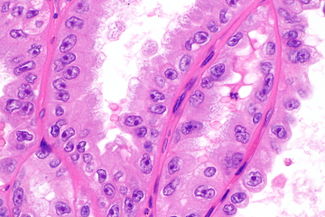Difference between revisions of "Hereditary leiomyomatosis and renal cell carcinoma syndrome"
Jump to navigation
Jump to search

m (fix typo) |
|||
| Line 12: | Line 12: | ||
#One of the following (pathologic) findings: | #One of the following (pathologic) findings: | ||
#*Multiple cutaneous leiomyoma where one was proven histologically. | #*Multiple cutaneous leiomyoma where one was proven histologically. | ||
#*One cutaneous leiomyoma in the context of a family history of | #*One cutaneous leiomyoma in the context of a family history of HLRCC. | ||
#*RCC with a morphology suggestive of HRLCC syndrome-associated RCC. | #*RCC with a morphology suggestive of HRLCC syndrome-associated RCC. | ||
Revision as of 16:08, 11 September 2018

Hereditary leiomyomatosis and renal cell carcinoma syndrome-associated renal cell carcinoma showing the classically described prominent nucleoli with perinucleolar clearing. H&E stain. (WC/Nephron)
Hereditary leiomyomatosis and renal cell carcinoma syndrome (abbreviated HLRCC), also hereditary leiomyomatosis and renal cell cancer, is an uncommon syndrome caused by fumarate hydratase (FH) gene mutations.[1][2]
Characteristics:
- Hereditary leiomyomatosis and renal cell carcinoma syndrome-associated renal cell carcinoma.
- Benign leiomyomas skin/uterus.
- Uterine leiomyosarcoma.
Formal criteria
The diagnosis of the HLRCC syndrome requires both #1 and #2:[3]
- A pathogenic FH mutation is present by molecular testing.
- One of the following (pathologic) findings:
- Multiple cutaneous leiomyoma where one was proven histologically.
- One cutaneous leiomyoma in the context of a family history of HLRCC.
- RCC with a morphology suggestive of HRLCC syndrome-associated RCC.
General
- Autosomal dominant inheritance[4] with variable penetration.[5]
- In one series of 21 families: 62% had renal cancer, 76% had cutaneous leiomyomas and 100% had uterine leiomyomas.[6]
Features - clinical:
- Leiomyomas - high penetrance.
- Hereditary leiomyomatosis and renal cell carcinoma syndrome-associated renal cell carcinoma.
- Often aggressive and significant cause of mortality.[8]
Note:
- The RCC in the past was typically diagnosed as papillary renal cell carcinoma.[9]
See also
References
- ↑ Online 'Mendelian Inheritance in Man' (OMIM) 136850
- ↑ Online 'Mendelian Inheritance in Man' (OMIM) 150800
- ↑ Adam, MP.; Ardinger, HH.; Pagon, RA.; Wallace, SE.; Bean, LJH.; Mefford, HC.; Stephens, K.; Amemiya, A. et al. Hereditary Leiomyomatosis and Renal Cell Cancer. PMID 20301430.
- ↑ Merino, MJ.; Torres-Cabala, C.; Pinto, P.; Linehan, WM. (Oct 2007). "The morphologic spectrum of kidney tumors in hereditary leiomyomatosis and renal cell carcinoma (HLRCC) syndrome.". Am J Surg Pathol 31 (10): 1578-85. doi:10.1097/PAS.0b013e31804375b8. PMID 17895761.
- ↑ Reyes, C.; Karamurzin, Y.; Frizzell, N.; Garg, K.; Nonaka, D.; Chen, YB.; Soslow, RA. (Jul 2014). "Uterine smooth muscle tumors with features suggesting fumarate hydratase aberration: detailed morphologic analysis and correlation with S-(2-succino)-cysteine immunohistochemistry.". Mod Pathol 27 (7): 1020-7. doi:10.1038/modpathol.2013.215. PMID 24309325.
- ↑ 6.0 6.1 Wei, MH.; Toure, O.; Glenn, GM.; Pithukpakorn, M.; Neckers, L.; Stolle, C.; Choyke, P.; Grubb, R. et al. (Jan 2006). "Novel mutations in FH and expansion of the spectrum of phenotypes expressed in families with hereditary leiomyomatosis and renal cell cancer.". J Med Genet 43 (1): 18-27. doi:10.1136/jmg.2005.033506. PMID 15937070.
- ↑ Toon, CW.; Hasovits, C.; Paik, J.; Field, M.; Chou, A.; Hugh, TJ.; Pavlakis, N.; Gill, AJ. (Jul 2014). "Skin rash, a kidney mass and a family mystery dating back to World War II.". Med J Aust 201 (1): 58-60. PMID 24999901.
- ↑ Chen, YB.; Brannon, AR.; Toubaji, A.; Dudas, ME.; Won, HH.; Al-Ahmadie, HA.; Fine, SW.; Gopalan, A. et al. (May 2014). "Hereditary leiomyomatosis and renal cell carcinoma syndrome-associated renal cancer: recognition of the syndrome by pathologic features and the utility of detecting aberrant succination by immunohistochemistry.". Am J Surg Pathol 38 (5): 627-37. doi:10.1097/PAS.0000000000000163. PMID 24441663.
- ↑ Humphrey, Peter A; Dehner, Louis P; Pfeifer, John D (2008). The Washington Manual of Surgical Pathology (1st ed.). Lippincott Williams & Wilkins. pp. 290. ISBN 978-0781765275.